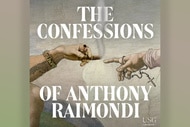Create a free profile to get unlimited access to exclusive videos, breaking news, sweepstakes, and more!
Journalist Mandy Matney Discusses Her Hit Podcast 'The Murdaugh Murders'
"Murdaugh Murders" podcaster Mandy Matney talks small-town journalism and vocal fry with Oxygen.com.

To reference the distinctive intro of every episode of the Murdaugh Murders podcast: We don’t know if investigative journalist Mandy Matney will get to the bottom of the complicated Murdaugh case in every way possible, but we do know she is devoted to trying.
Matney is the host and journalist behind the popular podcast, which is dedicated to examining the deaths and scandals connected to the Murdaughs, a prominent and affluent family that has exerted influence over Hampton County, South Carolina, by way of the legal system, for a century. Matney is committed to investigating the mysterious deaths, including at least two murders, along with a dizzying series of allegations of corruption, intimidation, and addiction that came to national attention in the aftermath of the murders of Maggie Murdaugh and her son Paul in June.
It’s an intricate, and often confusing case involving the alleged trip and fall death of a housekeeper, a boat crash that took the life of a teenage girl, a young man whose body was found on a roadside under very suspicious circumstances, and the horrific shooting deaths of attorney Alex Murdaugh’s wife, Maggie, and son, Paul. Earlier this month, Alex Murdaugh himself was allegedly shot in the head as he changed a tire on a rural road. He survived and later admitted he’d staged the murder attempt.
Murdaugh then promptly checked in to rehab for what a family spokesperson said was an opioid addiction. Soon after, he left the family law firm when it was alleged he’d been siphoning off the firm’s funds for his own use: an embezzlement scheme that could involve millions of dollars.
And all of this barely scrapes the surface. Really: you need to listen to thee podcast for all the details.
Through her dogged journalistic efforts, Matney has been covering this complicated case – and its complicated power dynamics– for years. As she often mentions in her podcast episodes, she’s a journalist and not a podcaster; she focuses on the facts and the people and isn't worried about vocal fry or big budget production.
A believer in the power of small-town journalism, Matney finished the University of Kansas with a degree in journalism before working as an editor at The Waynesville Daily Guide in the Ozarks of Missouri. She then worked at the Danville Commercial News in Illinois before moving to South Carolina where she worked at the Island Packet in South Carolina’s Low Country. She’s recently made the leap to another Low Country publication, this one an independent outlet, called FITSNews.
It’s clear that she cares, deeply, about this community. We recently spoke to Matney to learn more about what it was like to find herself at the center of a national news story, the ins and outs of investigative journalism, and learning to drown out the trolls.
(This interview has been edited for length and clarity.)
Oxygen: When you first put out those couple of episodes a lot of the replies weren’t about the story - they were about your voice, specifically your “vocal fry.” What was that like?
A lot of people said, which I think of as a huge compliment, "It sounds like my friend is across the table from me explaining a crazy story." I wasn't going for that, but I like that it's raw in that way. I've never believed that it needs bells and whistles. It just needs somebody who really knows the story, and that's me.
I didn't even know what a vocal fry was. First of all, I was terrified to do this at all. I've never been a public speaker; I've always been print. Never in a million years was I interested in any sort of broadcaster or radio, but I did love podcasts, and I loved Sarah Koenig on “Serial.” That changed my whole idea of journalism.
I got my first vocal fry email an hour after we launched the podcast. I had to Google it. I've been highly disappointed to be completely honest with you. It's one thing, whatever give me a bad review, but the people that emailed, and would send me really nasty tweets that were like, "Ugh," going on and on
Oxygen: What do you think is the value of local news being reported by a local reporter?
I just think you care a lot more because it's your community and it's your backyard. If you screw up on a story then everybody around you knows you screwed up on a story, you know. You can't burn sources because you have to circle back to these people. It's just a lot more complicated, but it works better. Every time I'm writing, especially with this story, I'm always thinking about all of my sources and making sure that they would be okay with what I'm writing, but also the truth is the most important part.
Oxygen: How are you different from TikTokers making commentary on this?
I’m different because I’m a journalist. I’m constantly on the phone with sources very close to these investigations. I’m fighting so hard for every fact I report in my story. Sometimes it takes me all day to report something that some TikTok person or true crime podcaster will just rattle off without crediting me. It’s infuriating because it devalues the real work that’s done by investigative journalists. They wouldn’t have the privilege to chit chat and giggle over true crime if it wasn’t for reporters like myself fighting for information.
I’m also different because I care.
I’m texting with victims almost every day and making sure my stories are doing them some justice. I’m emotionally tied to this story in so many ways. This is also my community, my state, my justice system that is in the middle of this national spotlight right now. I care deeply about this story because I’ve dedicated more than 2.5 years of my life to it. It’s not just work for me. It’s an all-consuming case that keeps getting deeper and more complicated, but I have a duty to always put the victims first.
Oxygen: The case has become personal to you. There’s a belief that journalism should be 100% objective without any distinct point of view. What do you say to that?
I have never honestly believed that journalism should be 100% objective and straight down the middle. I don't think that that's a fair way, or an effective way to write stories. I have a tweet on my desk from that I saw a couple weeks ago and printed it out. It says, "Journalism 101 rule, if someone says it's raining and another person says it's dry, it's not your job to quote them both. Your job is to look outside of the f---ing window and find out which is true."
Gina Tron contributed to this report.
You can watch "Alex Mudaugh. Death. Deception. Power." here or on Peacock starting January 6.




























